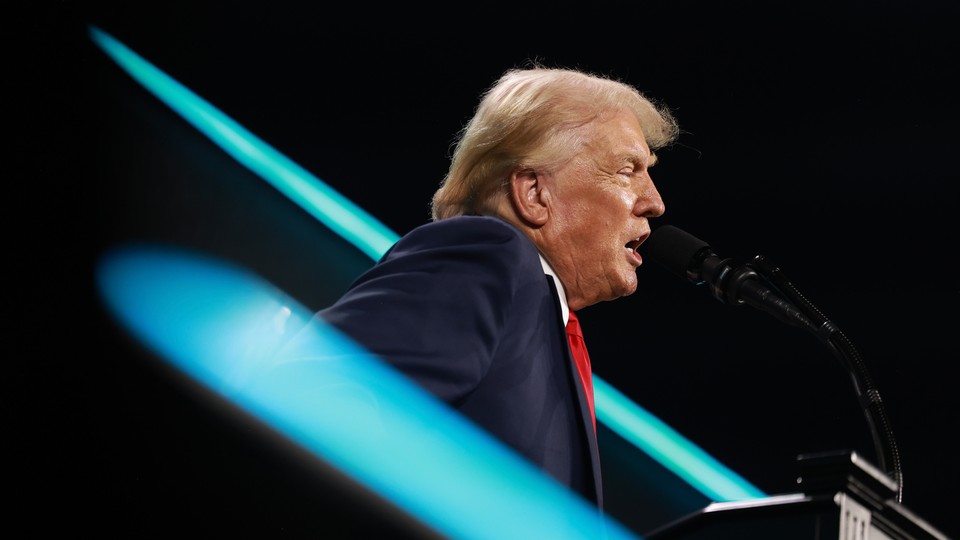Trump Says Americans ‘Won’t Have to Vote Anymore’ If He Wins
5 min read
Yesterday, former President Donald Trump told a group of supporters that they won’t have to vote again if they elect him to the presidency. “You won’t have to do it anymore,” Trump said at the Turning Point Believers’ Summit in Florida. “It’ll be fixed; it’ll be fine; you won’t have to vote anymore, my beautiful Christians.”
Trump’s remarks represent an extraordinary departure from democratic norms in the United States—rarely if ever has a major party’s presidential candidate directly stated his aim to make elections meaningless, a notorious hallmark of autocracy.
There are at least two ways of interpreting this statement. First, Trump could be implying that there won’t be any future elections if he comes to power. He may imagine himself as an American Xi Jinping, the Chinese dictator he routinely praises, a leader who’s declared himself “president for life.” As he often does, however, Trump left just enough room in what he said for plausible deniability. A second and slightly more charitable interpretation of his remarks is that Trump believes his presidency will entrench so many pro-Christian policies into the United States government that no future election could realistically undo his transformation of the country. Both interpretations lead to the same conclusion: that Trump is telegraphing his authoritarian intentions in plain sight, hoping to sever the link between voters and government policy.
Trump’s remarks last night are just the latest in his long record of expressing authoritarian ideas and admiration for strongmen in several undemocratic regimes—including Russia’s Vladimir Putin, the Philippines’ Rodrigo Duterte, and North Korea’s Kim Jong Un.
Since launching his first presidential campaign in 2015 by painting an entire group of immigrants as rapists, Trump has taken just about every page from the authoritarian playbook. He lies constantly. He calls the press “the enemy of the people,” a phrase so incendiary that Joseph Stalin’s successor removed it from Soviet propaganda. Trump even went so far as to label any critical reporting “fake.”
Throughout his first term, Trump engaged in despot-style nepotism and cronyism, hiring his unqualified daughter and son-in-law to oversee crucial briefs in government while elevating his son’s wedding planner to a top role in federal housing. He abused his power to offer pardons as an enticement or a reward to witnesses who could testify against him, including Paul Manafort, Roger Stone, Michael Flynn, Steve Bannon, and even the ex-husband of one of the Trumpiest cheerleaders on Fox News, Jeanine Pirro. And, like all authoritarians, he saw himself as the sole embodiment of the state—which is why he referred to the military brass as “my generals,” used his office to personally enrich himself, and attempted to orchestrate an egregious quid pro quo, trying to trade missiles for political dirt on his former opponent.
It was in the dying days of his presidency, though, that Trump’s authoritarian instincts were most clearly unmasked. Continuing on his long history of inciting political violence, Trump inspired a mob to attack the United States Capitol in the hope of overturning the election that he lost. With a fake-elector scheme, a phone call pressuring Georgia’s top election official to “find” additional votes, and his continuing refusal to accept election results, the former president has made it obvious that he cares about unrestrained power and self-interest, not democracy and national interest.
Since being ousted from the presidency by voters, Trump has pledged to be a dictator “on day one,” backing a series of formal policy proposals that could make that closer to reality. He’s floated the idea of executing America’s top general. He’s proposed executing shoplifters without a trial, a violation of due process seen only in the most brutal authoritarian regimes. And now Trump says voting will become obsolete if he wins. How many more ways can he tell us that he’s an existential threat to American democracy?
It would perhaps be more comforting if Trump’s anti-democracy machinations were hidden, covert, subtle. Then we might chalk up his ongoing political popularity to an unfortunate by-product of voter ignorance and wishful thinking. Instead, because he’s conveying his authoritarian intent in blunt language in front of rolling TV cameras, it’s impossible not to conclude that at least some of his base are what political scientists call “authoritarian voters”—citizens who care about getting their way even if it means destroying democracy in the process.
More dystopian still, Trump’s acolytes are co-opting the language of autocracy and are using it to describe fully democratic processes while ignoring or excusing Trump’s authoritarian ambitions. Republicans have begun talking about the “coup” against President Joe Biden, even though his decision to not seek reelection according to the formal rules of his own political party is a typical—and relatively common—way that unpopular incumbents behave in democratic states. Meanwhile, many Republicans insist that the insurrection on January 6 was a “normal tourist visit” and balk at the notion that a president launching a coordinated conspiracy, pressuring election officials to find additional votes, and inciting a violent mob to disrupt the peaceful transfer of power are textbook attempts at a so-called auto-coup.
This funhouse-mirror inversion risks creating the false impression that both sides are a threat to American democracy. In fact, Trump is a unique threat to the core institutions that constrain power in the United States and make self-governance possible. We must not make the mistake of, yet again, giving Trump an undeserved benefit of the doubt. He has told Americans who he is and what he intends to do. All that voters need to do is believe him—and care enough to vote for democracy. After all, Trump said it himself: If you don’t, you may never need to again.



